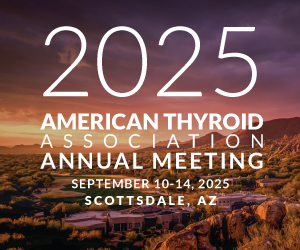Falls Church, Virginia. Sep. 20, 2012-–Children and young adult thyroid cancer patients who are treated with radioactive iodine have an elevated risk of developing a second primary malignancy, according to new data presented at the 82nd Annual Meeting of the American Thyroid Association in Québec City, Québec, Canada.
“The expected survival time for young patients with differentiated thyroid cancer is long. However, as new data elucidates, a need exists to judiciously weigh the benefits of radioactive iodine against the small, but real, increase in the risk of developing secondary primary malignancies,” said Elizabeth Pearce, MD, of Boston Medical Center, and Program Co-Chair of the ATA Annual Meeting.
Though increasingly used as a treatment for differentiated thyroid cancer, long-term implication of radioactive iodine in children and young adults are not well defined. Existing data are limited to case series with limited follow-up that, in particular, may underestimate the risk of these patients developing secondary primary malignancies. To date, epidemiologic analyses of secondary primary malignancies risk have only been performed in the adult population.
A team of researchers led by Jennifer Marti, MD, of Beth Israel Medical Center in New York, thus sought to characterize of secondary primary malignancies among children. They analyzed 3,850 children and young adult patients (< 25 years old) with differentiated thyroid cancer who were followed in the NCI SEER cancer registry from 1973 to 2008. Among patients who were treated with radioactive iodine, researchers observed 26 cases of secondary primary malignancies, outnumbering the 18.3 cases researchers had expected. Researchers found that patients who were treated with radioactive iodine (40%) had a significantly elevated relative risk (SIR 1.42, p = .05) of developing a secondary primary malignancy at all sites; their risk of developing a salivary malignancy was especially elevated (SIR = 34.12, p < 0.001). Researchers also estimated that over a decade, ~1 in 227 children and young adults will develop a secondary primary malignancy attributed to radioactive iodine treatment and ~1 in 588 will develop a salivary cancer attributable to radioactive iodine treatment. Patients who were not treated with radioactive iodine did not have an elevated risk of developing a secondary primary malignancy.
About the ATA Annual Meeting
The 82nd Annual Meeting of the American Thyroid Association will be held Sept. 19-23, in Québec City, Québec, Canada. This four-day creative and innovative scientific program, chaired by Elizabeth Pearce, MD, Boston Medical Center, and Douglas Forrest, PhD, National Institute of Diabetes and Digestive and Kidney Diseases, carefully balances clinical and basic science sessions on the latest advances in thyroidology. The ATA meeting is designed to offer continuing education for endocrinologists, internists, surgeons, basic scientists, nuclear medicine scientists, pathologists, endocrine fellows and nurses, physician assistants and other health care professionals. Visit www.thyroid.org for more information.
About the ATA
The American Thyroid Association (ATA) is the leading worldwide organization dedicated to the advancement, understanding, prevention, diagnosis and treatment of thyroid disorders and thyroid cancer. ATA is an international individual membership organization with over 1,600 members from 43 countries around the world. Celebrating its 89th anniversary, ATA delivers its mission through several key endeavors: the publication of highly regarded monthly journals, THYROID, Clinical Thyroidology and Clinical Thyroidology for Patients; annual scientific meetings; biennial clinical and research symposia; research grant programs for young investigators, support of online professional, public and patient educational programs through www.thyroid.org; and the development of guidelines for clinical management of thyroid disease. Visit www.thyroid.org for more information.
Media Contact
Bobbi Smith
Executive Director
of the American Thyroid Association
Email: thyroid@thyroid.org
# # #



